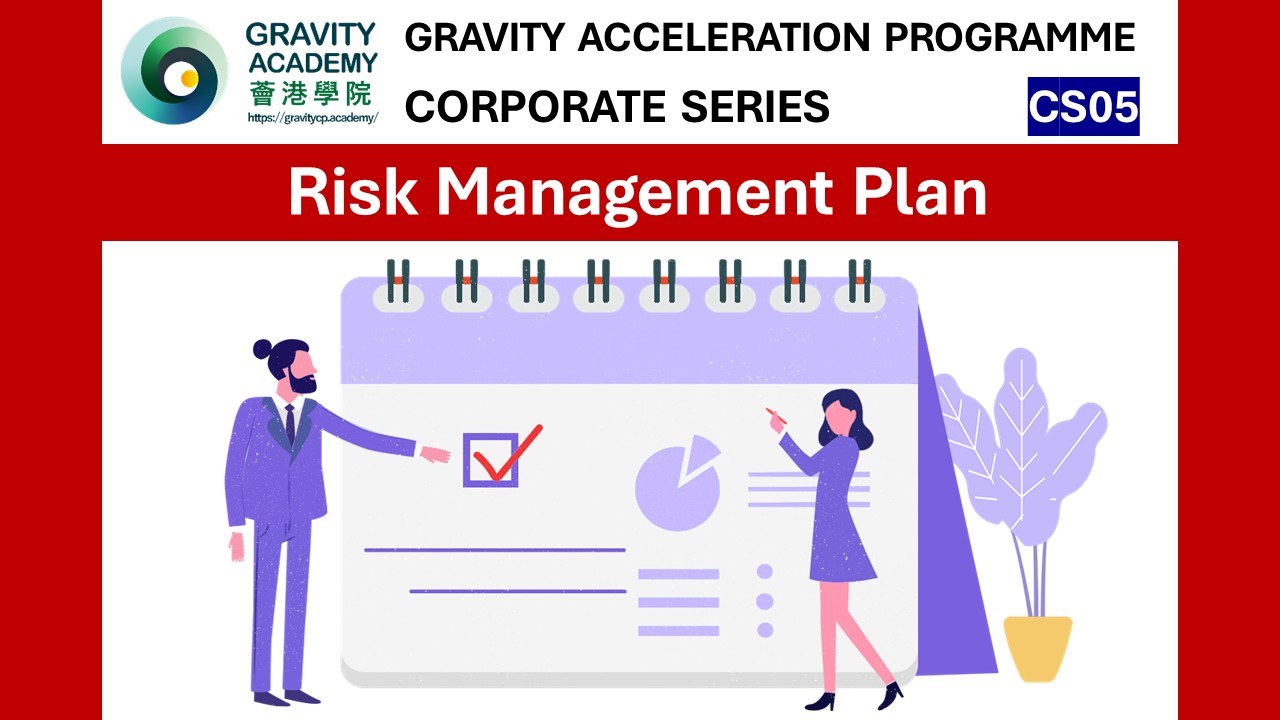CS05-Risk Management Plan

About Course
In today’s complex and rapidly changing business environment, effectively managing risk is crucial to ensuring an organization’s success and sustainability. The “Risk Management Plan” course, led by Ir Prof Alan Lam at Gravity Academy, equips participants with essential skills and knowledge to identify, assess, and mitigate risks in a structured and strategic manner.
Course Overview
This comprehensive course is designed to guide participants through the entire process of creating and implementing a robust risk management plan. It covers theoretical foundations, practical applications, and insights into creating a proactive risk management culture within an organization.
The Curriculum
The curriculum is carefully crafted to cover all aspects of risk management in twelve detailed modules:
- Introduction to Risk Management: Overview of risk management principles and its significance in today’s business landscape.
- Identifying Business Risks: Techniques for identifying various types of risks (strategic, operational, financial, and compliance) that can affect an organization.
- Risk Assessment and Analysis: Methods for assessing and analyzing risks to understand their potential impact and likelihood.
- Risk Prioritization: Criteria and processes for prioritizing risks based on their potential impact on the organization.
- Strategy Development for Risk Mitigation: Developing effective strategies to mitigate identified risks and minimize their potential impacts.
- Creating a Risk Management Plan: Step-by-step guidance on drafting a comprehensive risk management plan that outlines risk responses and mitigation strategies.
- Implementing Risk Controls and Mitigation Measures: Techniques for implementing risk controls and monitoring their effectiveness in reducing risk exposure.
- Monitoring and Reporting on Risks: Systems and processes for ongoing monitoring, reporting risks, and the effectiveness of implemented strategies.
- Risk Culture and Communication: Building a risk-aware culture within the organization and effective communication strategies to ensure clear understanding and engagement at all levels.
- Business Continuity Planning: Developing plans to ensure the continuity of business operations in the event of significant risk events.
- Reviewing and Updating the Risk Management Plan: Methods for regularly reviewing and updating the risk management plan to adapt to new risks and changes in the business environment.
- Case Studies and Best Practices: Real-world case studies illustrating successful risk management practices and lessons learned from various industries.
The Instructor
Ir Prof Alan Lam is a renowned expert in strategic management and risk assessment with extensive experience in both academia and industry. His deep understanding of risk management dynamics and proactive teaching style makes him an ideal guide for this course.
Why Choose This Course
This course is essential for those who aim to:
- Gain a comprehensive understanding of risk management processes.
- Develop practical skills in creating and implementing effective risk management plans.
- Enhance their ability to foresee and mitigate potential risks in their organization.
What Will You Obtain
Participants will receive:
- A certificate of completion, demonstrating their expertise in risk management planning.
- The ability to create, implement, and maintain an effective risk management plan.
- Enhanced skills in strategic decision-making related to risk assessment and mitigation.
Suitable Candidate
This course is ideal for:
- Business owners and managers who wish to implement robust risk management practices.
- Risk management professionals looking to enhance their skills and knowledge.
- Anyone involved in strategic planning, operations, finance, or compliance roles.
Student Ratings & Reviews
